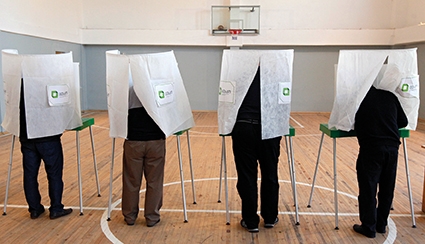The Pre-Electoral Mood
Op-ed
Tension and discomfort saturate the spectrum of political beliefs and practices in Georgia, and that’s not all our worn-out and fed-up, although still responsive, electorate has started feeling prior to the parliamentary elections of 2020, and prior to some of the midterm ones too. Also noticeable in the country’s heating-up political minefield are the explosive public moods, among them apprehension about possible errors lurking behind the scene; likely wrongs that will need extraordinary adjustments; anxiety and fear that something bad or unpleasant might happen; misgivings about the honesty of politicians in general; uneasiness and worry concerning the chances of the promoted aspirants to eminence; heightened disbelief in the integrity of participating political forces in the incipient electoral marathon; second thoughts about who deserves to be trusted more with the future of the nation.
Georgia has seen countless elections of various levels and significance in the last thirty years but has never been completely happy with the consequential post-electoral developments because something has always gone wrong with the choice of the people. This is why the pre-electoral strain and fretfulness are always present, our electorate having learnt many good and bad lessons in the post-soviet political past.
In this overall picture of electoral feelings and attitudes, the most definitive moment is certainly the struggle for power between the ruling party, assisted by the media working on their side, and the oppositional forces, helped by the means of mass communication, acting in their favor. I would not be very far from the truth if I said a neutral and objective media would have been the best thing that could happen to an average voter in Georgia to help them make a good decision at the solemn moment of his or her thoughtful privacy within the confines of the palling station. To wit, the voter who is safe from brainwashing would feel politically and morally independent to make the most reasonable choice.
I tend to qualify the entire situation, tongue-in-cheek of course, as a split bunch of kids on the block, ready to beat each other black-and-blue for the best girl in the neighborhood, in our case, the girl being sweet power and the cherished right to rule the motherland, mandated by its majesty, the people. The ‘kids’ would do anything, literally anything, to win the ‘girl’s’ heart and conquer her mind: fact-finding against each other; hurling derogatory recriminations on the opponent’s head; hissing deprecation-centered rhymes upon one another; showering the adversary with dirty slanderous inferences; celebrating any bad news connected with the challenger; ruining each other’s life and career with venomous insinuations; using a muscle to physically overpower the foe; desperately pursuing the goals that serve for their survival; relentlessly fighting for the triumph of the party of affiliation and the defeat of the rivaling alliance.
Now the question is if the nation is a winner or loser as a result of this kind of electoral collision. Another question is if this might be called a sample of democracy in the immediate meaning of the word which, in the best-case scenario, should be working on our people’s better future and current quality of life. There is a third question that might be the most imperative among the raised three: on whose shoulders will the blame be loaded if the development of the country suffers a serious drawback because the rulers of the nation and their opponents are incapable of entering constructive competition to give our people a chance to proceed productively on the road to success and happiness?
I’m afraid, when push comes to shove, every responsible shoulder will momentarily break away from the burden of fault with habitual political cunning and professional skill. Meanwhile, the election-ridden nation will continue the ever-flowing electoral process wistfully to somehow find itself at the gate of the thirty-year promise of post-communist paradise. Blessed are the hopeful, aren’t they?
By Nugzar B. Ruhadze
Image source: neweurope.eu












